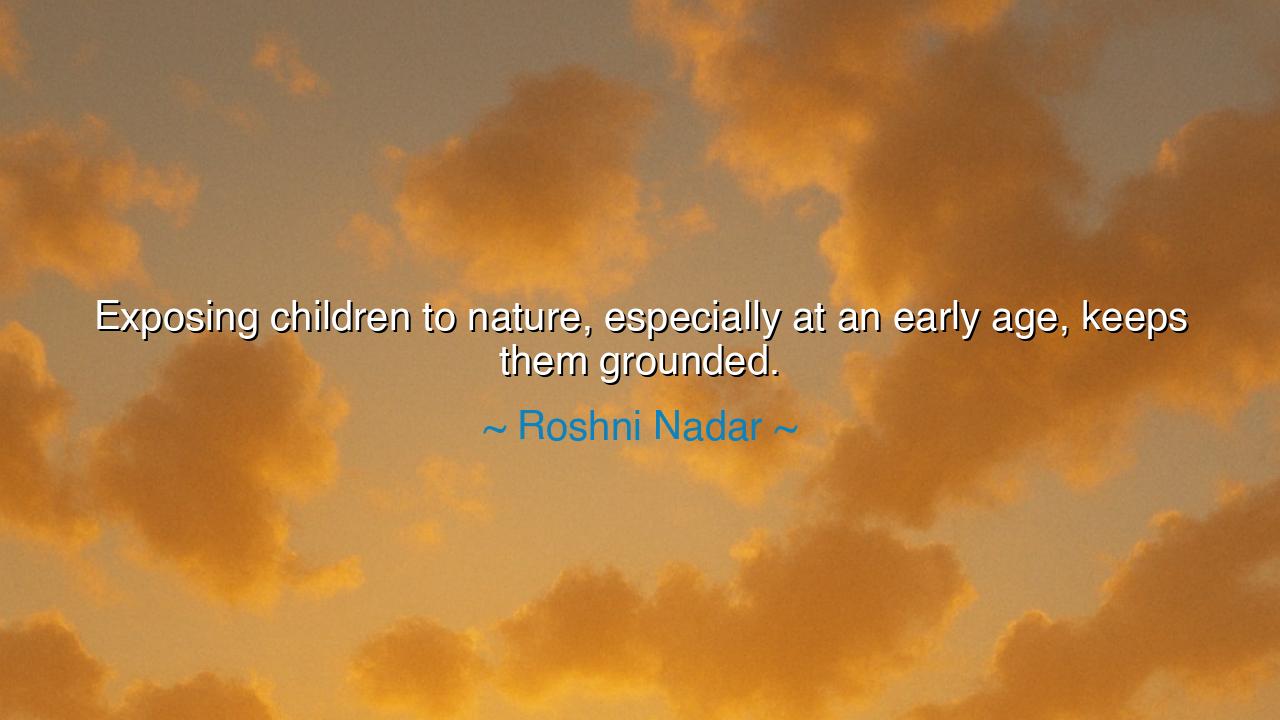
Exposing children to nature, especially at an early age, keeps






In the words of Roshni Nadar, “Exposing children to nature, especially at an early age, keeps them grounded.” These words shine with the gentle light of wisdom—born from observation, humility, and love for the natural world. Nadar, a business leader and philanthropist, speaks not merely of outdoor play or childhood pastimes, but of something far deeper: the soul’s connection to the earth, the bond between human spirit and the living world that sustains it. In this age of speed and glass, when children grow up surrounded by machines and screens, her words rise like an ancient echo—a reminder that we are not made only of thought and ambition, but also of soil, water, wind, and wonder.
To be grounded is to remember where you came from, to feel the pull of the earth beneath your feet and the rhythm of life that moves through all things. When a child walks barefoot on the earth, watches the flight of a bird, or feels the rain upon their skin, something within them awakens—a sense of humility, of belonging. Nature teaches without words; its lessons are felt in silence. A tree does not rush to grow, yet it endures. A river bends and flows, yet never loses its strength. When children are raised close to such truths, they learn patience, resilience, and gratitude. They grow not only in intellect but in balance, rooted in both self and world.
The ancients revered this connection. In Greece, the philosopher Plato taught that the education of the young should begin outdoors, where the soul could breathe and the senses could be sharpened by the beauty of creation. In India, the gurukuls were often nestled amid forests, for the teachers believed that true wisdom came not from walls but from the open sky. Even the Stoics of Rome—men of reason and empire—spoke of aligning one’s soul with nature’s order. They knew that a person cut off from nature grows restless, proud, and blind to the simplicity of life. Nadar’s insight, though spoken in modern times, springs from this same ancient root: to grow well, the young must stay close to the earth that gives them life.
Consider the story of Jane Goodall, who as a child spent hours watching animals in her garden, filled with curiosity and awe. That childhood wonder became the seed of a lifetime of discovery. Her love for nature not only shaped her as a scientist but as a human being—humble, patient, and deeply compassionate. She often said that being close to the natural world reminded her of our interconnectedness, that humanity is but one part of a vast and living web. Had her childhood been spent in confinement, her vision might never have blossomed. So it is with every child: their early encounters with the wild world shape the kind of adults they become—whether selfish and detached, or kind and wise.
The abnormality of modern life lies in our distance from this truth. Many children now grow up without ever seeing the stars unclouded by city lights or hearing the sound of true silence. The result is a kind of spiritual imbalance: they know technology but not stillness, they can navigate virtual worlds but not the forests of their own hearts. Nadar warns us gently against this loss, for to forget nature is to forget ourselves. A child who plays under the sun learns freedom; one who climbs trees learns courage; one who tends a garden learns responsibility. Such lessons cannot be taught—they must be lived.
The lesson, then, is both simple and profound: return the young to the earth. Let them walk where the grass grows, let them see how a seed becomes a tree, let them feel small beneath the vastness of the sky. These experiences do more than entertain—they shape character, anchoring the child’s spirit against the storms of life. Parents and teachers alike must remember that to raise a wise heart, one must first root it in nature.
So, my child, heed Roshni Nadar’s wisdom. When you raise your own children—or when you seek to heal your own weary spirit—step outside. Touch the earth. Listen to the wind. Teach them, and yourself, to love what endures. For in loving nature, we learn to love truth, simplicity, and peace. And those who remain grounded in the living world will never be easily swayed by the noise of the fleeting one.






AAdministratorAdministrator
Welcome, honored guests. Please leave a comment, we will respond soon